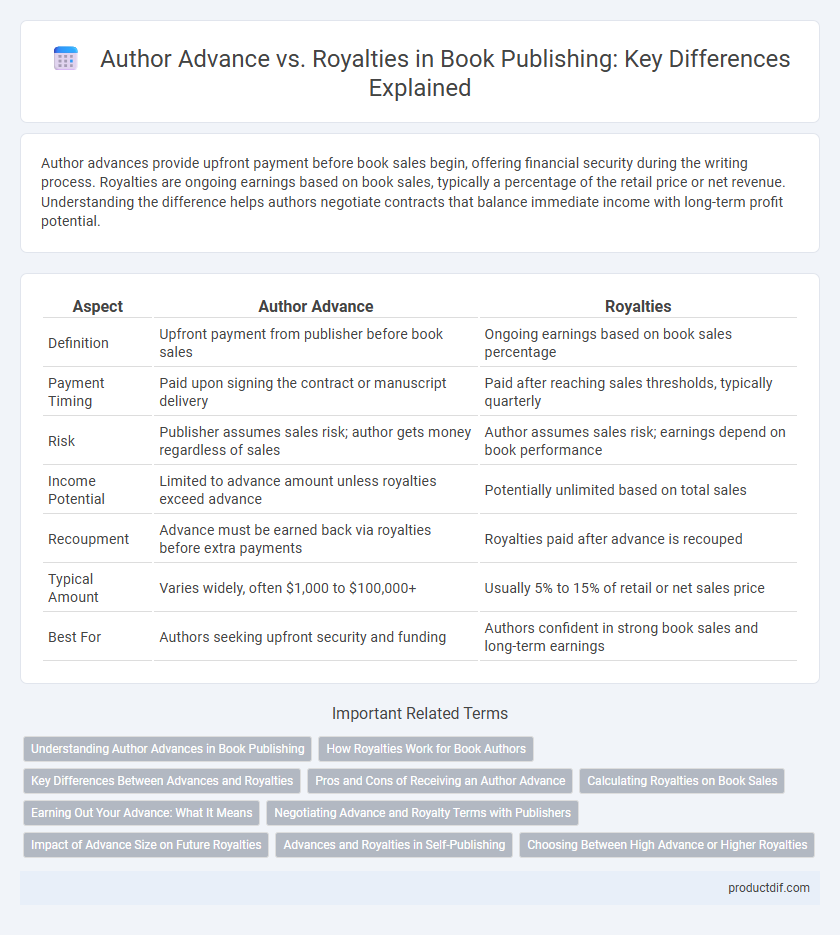Author advances provide upfront payment before book sales begin, offering financial security during the writing process. Royalties are ongoing earnings based on book sales, typically a percentage of the retail price or net revenue. Understanding the difference helps authors negotiate contracts that balance immediate income with long-term profit potential.
Table of Comparison
| Aspect | Author Advance | Royalties |
|---|---|---|
| Definition | Upfront payment from publisher before book sales | Ongoing earnings based on book sales percentage |
| Payment Timing | Paid upon signing the contract or manuscript delivery | Paid after reaching sales thresholds, typically quarterly |
| Risk | Publisher assumes sales risk; author gets money regardless of sales | Author assumes sales risk; earnings depend on book performance |
| Income Potential | Limited to advance amount unless royalties exceed advance | Potentially unlimited based on total sales |
| Recoupment | Advance must be earned back via royalties before extra payments | Royalties paid after advance is recouped |
| Typical Amount | Varies widely, often $1,000 to $100,000+ | Usually 5% to 15% of retail or net sales price |
| Best For | Authors seeking upfront security and funding | Authors confident in strong book sales and long-term earnings |
Understanding Author Advances in Book Publishing
Author advances are upfront payments made by publishers to authors before the book's release, typically based on anticipated sales and market potential. Unlike royalties, which are calculated as a percentage of book sales, advances are recoupable, meaning authors earn royalties only after the advance amount has been earned back through sales. Understanding the financial dynamics of advances helps authors negotiate better contracts and manage their income streams effectively in the competitive publishing industry.
How Royalties Work for Book Authors
Book authors receive royalties as a percentage of each book sale, typically ranging from 7% to 15% of the retail price or net revenue, depending on the publisher and format. Royalties are paid out periodically, often semi-annually, after the author's advance has been earned out, meaning the advance has been covered by the accrued royalties. The royalty structure incentivizes authors to sell more copies, with print, e-book, and audiobook formats potentially offering different royalty rates.
Key Differences Between Advances and Royalties
Author advances are upfront payments made by publishers to writers before book sales occur, typically reflecting anticipated earnings and providing financial security during the writing process. Royalties are ongoing payments calculated as a percentage of book sales revenue, paid to the author after the advance has been earned out. Key differences include timing of payment, financial risk borne by the author, and how earnings scale with the book's commercial success.
Pros and Cons of Receiving an Author Advance
An author advance provides upfront payment that offers financial security and allows writers to focus on completing their work without immediate sales pressure, but it may come with the drawback of limiting future royalty earnings until the advance is fully recouped by the publisher. Receiving an advance can enhance credibility and motivate authors, yet it can also create stress if the book underperforms, since the author might not earn additional income beyond the advance. The upfront advance amount varies widely based on the publisher's confidence, affecting the potential lifetime royalties an author can earn.
Calculating Royalties on Book Sales
Calculating royalties on book sales involves applying the author's agreed percentage to the net sales revenue, which is typically the retail price minus discounts and returns. Advances are payments made upfront against future royalties, requiring authors to earn back the advance before receiving additional royalty payments. Royalty rates often range from 7% to 15%, varying based on format, publisher, and sales volume.
Earning Out Your Advance: What It Means
Earning out your advance occurs when book sales generate royalty payments that surpass the initial advance paid by the publisher. Authors receive an upfront lump sum, but royalties only begin after this advance is fully recouped through sales revenue. Understanding the advance versus royalties dynamic helps authors gauge the financial success and long-term profitability of their book publishing contract.
Negotiating Advance and Royalty Terms with Publishers
Negotiating advance and royalty terms with publishers requires a clear understanding of industry standards, where advances typically range from a few thousand to six figures depending on the author's track record and book potential. Authors should aim to secure a fair advance based on market comparisons while pushing for higher royalty percentages, often starting around 10-15% for hardcover sales. Contract negotiations must include clauses for royalty escalators, subsidiary rights, and detailed accounting practices to maximize long-term earnings and protect intellectual property.
Impact of Advance Size on Future Royalties
Larger author advances can reduce future royalties because the publisher recoups the advance from sales before additional royalties are paid. This means that high advances delay or even eliminate royalty payments until the book's sales exceed the advance amount. Consequently, authors receiving substantial advances may face slower royalty income despite strong sales performance.
Advances and Royalties in Self-Publishing
In self-publishing, authors typically do not receive traditional advances, which are upfront payments made by publishers based on expected book sales. Instead, self-published authors earn royalties directly from each sale, often retaining a higher percentage--commonly between 60% to 70%--compared to traditional publishing royalties that range from 5% to 15%. This model allows self-published authors to control pricing, distribution, and marketing while benefiting from immediate earnings without the risk of recouping an advance.
Choosing Between High Advance or Higher Royalties
Choosing between a high author advance and higher royalties significantly impacts an author's long-term earnings and financial security. A high advance provides immediate guaranteed income, often beneficial for debut writers needing upfront funds, whereas higher royalties depend on book sales performance, offering potentially greater income over time if the book sells well. Understanding market potential, contract terms, and personal financial needs helps authors strategically decide which option aligns best with their career goals.
Author Advance vs Royalties Infographic

 productdif.com
productdif.com